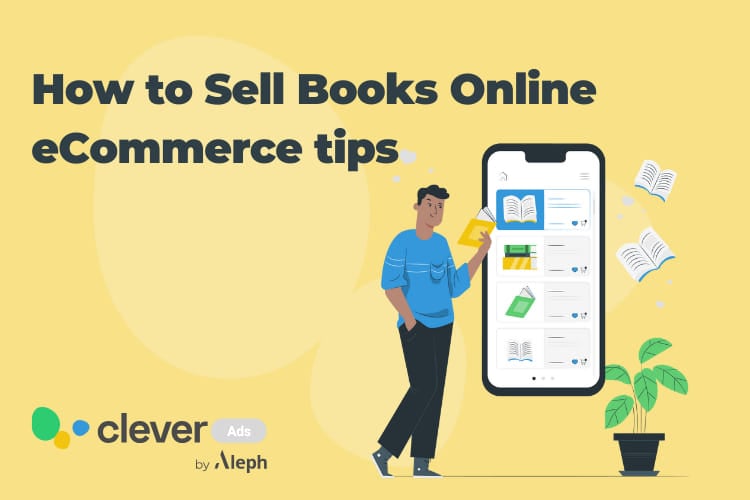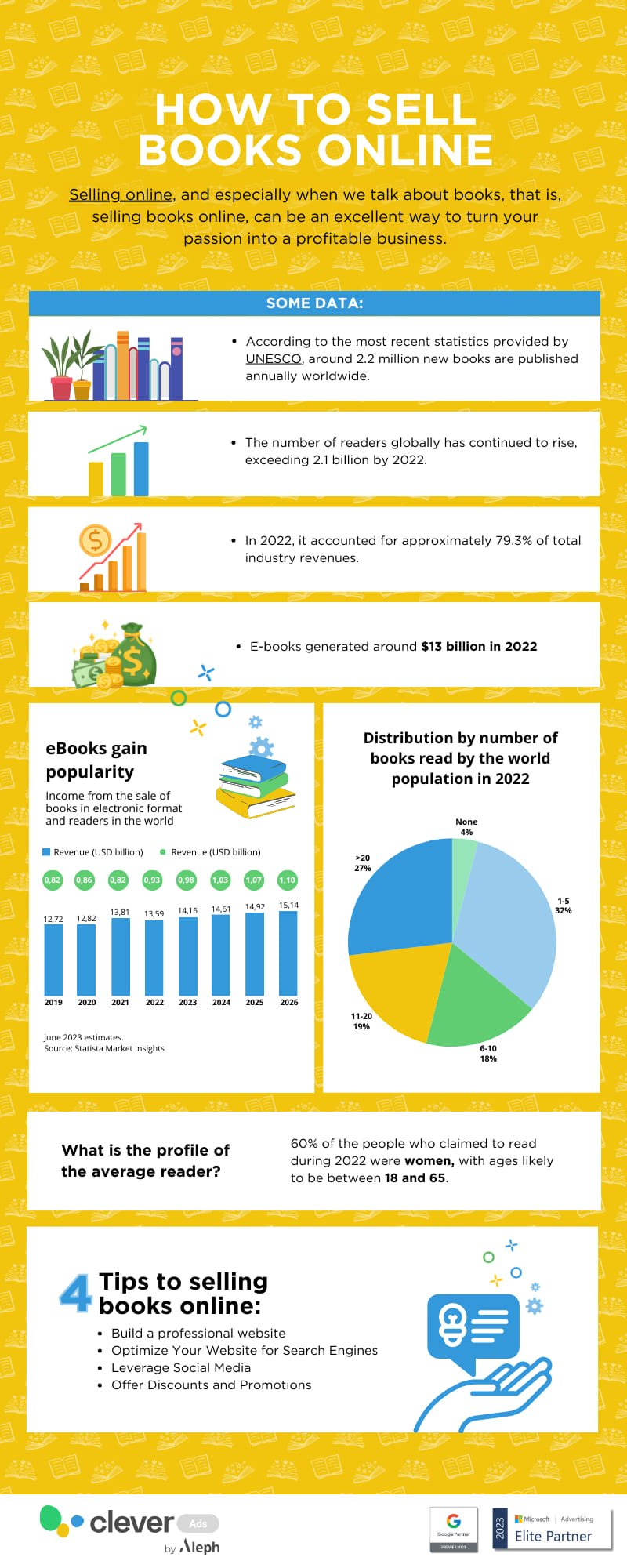How to sell books online – The best eCommerce tips!
Are you a book lover looking to start an online bookstore or an author seeking to promote your book to a global audience? Then, you are in the right place! Selling online, and especially when we talk about books, that is, selling books online, can be an excellent way to turn your passion into a profitable business. In today’s digital age, where consumers prefer to shop online, having an online bookstore can be an advantage. In this article, we will provide you with the best eCommerce tips to help you sell books online successfully.
By the way, have you included Book Day in your marketing calendar?
Actualized Book Selling Market Data
According to the most recent statistics provided by UNESCO, around 2.2 million new books are published annually worldwide. Despite concerns about declining interest in reading, especially among young people, due to the rise of other forms of entertainment, the number of readers globally has continued to rise, exceeding 2.1 billion by 2022.
Historically, paper has been the main source of revenue in this market and remains so. In 2022, it accounted for approximately 79.3% of total industry revenues. However, digital formats have been gradually gaining importance. For example, e-books generated around $13 billion in 2022, with an increasing trend in penetration since 2017. About 12.5% of the global population had read PDF versions or other similar formats in 2022, and this percentage is even higher among readers, with 32% opting for e-books during the same year.
The popularity of e-books varies by region. While sales declined by around 10% in France and Italy in 2021, the United States stands out as the leading market, with around 190 million e-books sold per year on average, doubling Japan’s revenues in 2022 and almost equaling those of the other top four countries combined.
As for audiobooks, although their audience is smaller, they accounted for about 10% of readers in 2022. Despite this, this subsector was worth around $5.3 billion last year and is expected to account for more than one-fifth of total global book industry revenues by 2030. North America, especially the United States, leads in this regard, although significant growth is seen in Europe, especially Germany, which is expected to continue in the coming years.
Reader profile & consumption habits
Now we ask ourselves: what is the profile of the average reader? According to a survey conducted in December 2022, so-called casual readers predominate, those who read between one and five books a year, and have a preference for history, mystery and biographies over other genres such as self-help or romance. As for who shows a greater interest in reading in general, the answer is clear: women. Approximately 60% of the people who claimed to read during 2022 were women, with ages likely to be between 18 and 65. Interestingly, these age groups accounted for just 5% of global readers.
Historically, the more privileged classes of society were the only ones with access to an education, and thus the only ones able to read. Although later movements, such as the Protestant Reformation, broadened access to literature, there is still a relationship between the average number of books read and economic status. Examples such as Canada, France and the United States demonstrate this. These countries, with some of the highest GDPs per capita in 2022-between $44,800 and $69,231-also recorded high annual reading rates. Canadians and French read an average of 17 books a year, while Americans reached 12. However, in terms of weekly consumption, the situation differs, with none of these countries ranking among the top. Residents of India lead in this regard, devoting almost 11 hours a week to reading, followed by Thailand and China.
Build a Professional Website
The first tip to selling books online is to build a professional website. Your website is your virtual storefront, and it should be designed to showcase your books and provide a seamless shopping experience to your customers. You can build your website using popular eCommerce platforms like Shopify or WooCommerce. For authors managing multiple titles or for anyone venturing into a subscription-based model for special editions, considering a professional website that supports Webflow’s subscription billing option can be crucial. This functionality enables you to establish a secure, recurring payment system directly on your site, enhancing customer experience with seamless checkout processes.These platforms offer various templates and themes to choose from, making it easy for you to design your website.
When designing your website, make sure to include the following:
- Clear product descriptions and images.
- Easy navigation.
- Secure payment gateway.
- Customer reviews and ratings.
- Contact information and support.
Optimize Your Website for Search Engines
The second tip to selling books online is to optimize your website for search engines. Search engine optimization (SEO) is the process of improving your website’s visibility on search engine results pages (SERPs). The higher your website ranks on SERPs, the more traffic you’ll get to your website, which can lead to more sales.
To optimize your website for search engines, you can do the following:
- Use relevant keywords in your website content.
- Create quality backlinks to your website.
- Improve your website loading speed.
- Use meta tags and descriptions.
- Publish quality content regularly
Leverage Social Media
The third tip to selling books online is to leverage social media. Social media platforms like Facebook, Twitter, Instagram and TikTok offer a vast audience that you can use to promote your books and engage with your customers. You can create a business page on these platforms and share updates about your books, upcoming releases, and promotions.
To leverage social media effectively, you can do the following:
- Use relevant hashtags in your posts.
- Run paid advertising campaigns.
- Engage with your followers by responding to their comments and messages.
- Collaborate with influencers and book bloggers.
- Create engaging content like book trailers, author interviews, and behind-the-scenes content.
Offer Discounts and Promotions
The fourth tip to selling books online is to offer discounts and promotions. Consumers are always looking for a good deal, and offering discounts and promotions can help you attract more customers and increase your sales. You can offer discounts on bulk purchases, bundle deals, or seasonal promotions like holiday sales.
To offer discounts and promotions, you can do the following:
- Use coupon codes.
- Offer free shipping.
- Create limited-time offers.
- Run flash sales.
- Create loyalty programs for repeat customers.
Conclusion
Selling books online can be a profitable business if done right. Building a professional website, optimizing it for search engines, leveraging social media, and offering discounts and promotions are some of the best eCommerce tips to help you sell books online successfully. Remember to keep up with the latest book selling market trends and adjust your strategy accordingly. With these tips, you can create a successful online bookstore and reach a global audience of book lovers. Happy selling!
Extra tip: have you had a chance to explore the PMAX campaigns initiated by Google and Microsoft? They’re certainly not to be overlooked!






Interesting blog. Keep it up and share such informative blog with us.